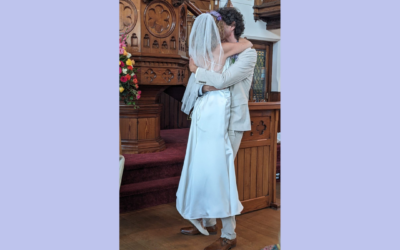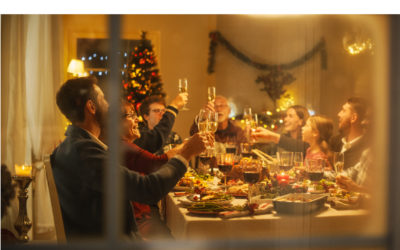Christmas is a time when we offer our gifts, our time and our presence to each other. At this time of giving and receiving, people’s expectations – others’ and our own – can be high. And this can make saying (and receiving) a No more challenging than usual.
We often have a fair idea of what others expect of us (especially family members because we know them well), and we may fear that saying No will disappoint, upset or hurt them. We might even fear being blamed for “ruining Christmas”. And indeed, we might be blamed.
Or maybe we won’t be.
I used to take a flight to visit my parents every Christmas. To a large extent, I did this on autopilot. It’s what I always did, it was what I assumed was expected of me, and for a long time I didn’t question it.
Then one year, I realized that I would really prefer to stay at home. As I prepared to tell my parents that I wouldn’t be visiting, I braced myself for their reaction, expecting them to be offended and upset.
But…they were delighted, and promptly booked to go abroad on a sun holiday instead, something they really wanted to do, and something they’ve done every year since. If I’d stopped myself from saying No out of fear of their reaction, perhaps we’d have all turned up for many more Christmases with all of us secretly preferring we were somewhere else!
For many, Christmas time can mean spending more time with family or friends than usual. Because of this, people often tread around each other with particular care in order to avoid potential conflict, including saying Yes when really, it’s a No.
This might at first glance seem like a good solution for keeping the peace, but each time you say Yes when you want to say No, you are sacrificing your own inner peace to please others, and giving up your freedom to follow your own desires.
And if there are lots of people in the room at Christmas time who are doing this – which means doing things they don’t really want to do, giving what they don’t really want to give, and perhaps feeling unhappy, frustrated or even resentful – what might appear on the surface to be a peaceful gathering, is not really peaceful at all.
In fact, with a few Christmas drinks added, it could well be the perfect recipe for exactly the kind of conflict everybody tried to avoid by saying Yes when really, they wanted to say No.
So bearing all this in mind, you might choose to give yourself and others your authentic No as a gift this Christmas. If so, here are some tips:
Acknowledge that your No is a gift to yourself because it sets you free from doing or giving what you don’t really want to do or give, which frees you to do and give what you really want to!
Recognise that your No is a gift to others, because expressing your authentic No means you show others more of your authentic self – and showing your authentic self can make you more available for more real and meaningful connection. It also shows others, by example, that it is okay to say No.
Ask yourself some soul-searching questions, such as:
– To what, or whom, do I want (or maybe even really need) to say No this Christmas?
– What am I doing just because I do it every year and/or it’s what’s expected of me?
– If I say No, what am I saying Yes to instead (i.e. what will I be free to do/have instead)?
– What might be stopping me from saying No? Write down your fears so you are clear on what they are. Is saying Yes really a good solution?
– What will support me to say No?
Be sure to identify any assumptions you wish to say No to. In my example about visiting my parents for Christmas, I wasn’t actually asked by them to visit – it was just assumed (by both my parents and I) that I would. So it was an assumption that I needed to say No to, not an invitation or request. Invitations (e.g. “Would you like to come to the Christmas party?”) and requests (“Will you assemble my new toys now?”) are easier to identify as needing a Yes or No response. So take a step back and look at what’s being automatically assumed. And ask yourself if this is what you really want.
Give yourself permission to say No and do what YOU really want to do, despite what others’ expectations of you might be. And check that you are giving others permission to say No to you, rather than holding them hostage to your expectations.
Acknowledge that you are not responsible for others’ reactions. They have the right to feel and express their feelings, and you are not responsible for their experience.
Express your No kindly and with an open heart, when you can. You can say No to what’s being offered, asked or assumed without disconnecting from others or making them wrong for inviting, asking, or assuming.
Prepare yourself to say No. What kinds of invitations and requests are likely to come up? For example, if your sister has asked you to look after her children every St Stephen’s/Boxing Day for the past 5 years, and you’ve done so each year, check in with yourself about whether you want to do it this year. If it’s a No, prepare yourself to say it.
And prepare yourself in general for the many surprise opportunities that are likely to come up for you to express your No.
And let us all raise a glass to giving and receiving the gift of an authentic No this Christmas!
More blogs
What’s Self-Love Got To Do With It? My Wedding at Age 47
I recently got married to someone wonderful, who is consistently available, loving and deeply kind (who happens to be quite a bit taller than me as you can tell by my feet!), which still feels like something of a miracle to me - because I can honestly say that there...
What’s Self-Love Got To Do With It? My Wedding at Age 47
I recently got married to someone wonderful, who is consistently available, loving and deeply kind (who happens to be quite a bit taller than me as you can tell by my feet!), which still feels like something of a miracle to me - because I can honestly say that there...
Relationships and Self-Care at Christmas and Holiday Time
The Christmas and holiday period can powerfully magnify both the joys and the challenges of life, and our relationships. The joys can be wonderful - getting together with those we love, celebration, fun, gifts, spiritual communion, a break from the usual day-to-day,...
I've always wanted to make the lifelong commitment of partnership in marriage, and it's been a very long journey for me to get to my wedding day at age 47. I spent a lot of my adult life in painful patterns when it came to romantic relationship, which included being attracted to those who weren't really available, and not able, for their own reasons - and I say this without any blame - to meet and love me in all the ways I wanted to be met and loved. And I wasn't willing to settle for a relationship that wasn't truly right for me.
It has taken a lot of determination, courage and persistence to overcome and heal the obstacles within me that got in the way of experiencing the relationship I wanted, and indeed to become the kind partner that I would myself want to commit to.
I could write a whole book about the process (maybe one day I will), but for now I'll just say that the most important aspect of it has been (and always will be) my commitment to Love in my primary relationship - my relationship with myself.
Love with a capital "L" is unconditional - it can't be fallen out of. So even when I fall out of "like" with myself, it's always in the greater context of my commitment to loving myself, which means I always come back to the recognition that I am unconditionally loveable and worthy of love.
We all know that Self-Love can be a real challenge. It requires commitment to doing what it takes to have a truly healthy relationship with ourselves - an ongoing deepening of self-awareness, attunement and kind responsiveness to our needs and feelings, being open to seeing things about ourselves that are hard to look at and own, and learning to embrace parts of us that we feel the impulse to push away and disconnect from.
But it is so incredibly worth it - and the alternative certainly isn't a recipe for happiness - because self-love, or the lack of it, sets the tone - and determines the quality - of all of our relationships. Whilst I'm loving and embracing myself, I can't not be loving my husband... I can't not be loving everyone (which definitely includes setting healthy boundaries, and sometimes walking away, of course).
Even when I don't like parts of them. Even when there's conflict and it's painful. My commitment to Love guides me back home to my deepest self and invites me to do the work I need to do to meet the other with Love - whether it's learning to communicate more clearly and kindly, listening openly to feedback, or soothing and holding the vulnerable parts of myself more fully and compassionately when there's reactivity in our relating, to name a few examples.
Whether I'm coaching an individual or a couple around their relationships, I see that the most important part of my job is to keep inviting folk back to their relationship with themselves. That's always what needs kind and loving tending to first, whatever is happening in their relationships with others.
Which is why I'm so passionate about supporting people with self-love, and with making it practical - so it's more than just an idea, or yet another thing to have to achieve or "get right".
If you’re interested in finding out more about the coaching and workshops I offer, please do get in touch at info@nicola-madden.com
Ps. I am definitely not saying "you have to love yourself before anyone else can love you". This is a very unhelpful idea! And is simply not true.



